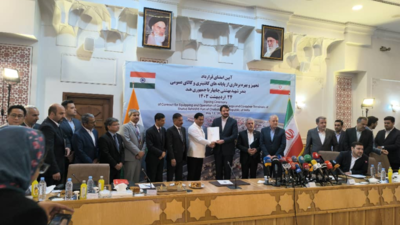- News
- India News
- Chabahar agreement: India takes major step in Central Asia with Iran port deal
Trending
This story is from May 13, 2024
Chabahar agreement: India takes major step in Central Asia with Iran port deal
India and Iran on Monday signed a 10-year contract to develop and equip the strategic Chabahar port in Iran as India seeks to grow trade in west and central Asia. The agreement will give India 10-year access to use the port, located close to Iran's southeastern border with Pakistan, according to Iran's Ministry of Roads and Urban Development.

India signed a 10-year contract with Iran on Monday to develop and operate the Iranian port of Chabahar.
Under the agreement, India Ports Global Limited (IPGL) committed to investing $370 million to enhance the port's infrastructure.

Why it matters
- Chabahar port's strategic location on Iran's southeastern coast, close to the Pakistani border, positions it as a pivotal gateway for India’s trade ambitions, enabling direct access to Central Asia.
- Located on the Gulf of Oman near the Iran-Pakistan border, it offers India a crucial trade route bypassing Pakistan.
- This is particularly beneficial for trade with landlocked Afghanistan and Central Asian countries like Uzbekistan, Kazakhstan, and Turkmenistan.
- The agreement leverages the International North-South Transport Corridor (INSTC), a 7,200-kilometer-long network connecting India, Iran, Russia, and Europe.
- Bypassing Pakistan allows India to diversify its trade routes and reduce dependence on its neighbor.
- The deal is expected to unlock significant economic benefits for both India and Iran. India Ports Global Limited (IPGL) will invest $370 million in developing port infrastructure and equipment. This investment is expected to:
- Increase cargo handling capacity at the port.
- Improve efficiency and reduce transportation costs.
- Facilitate trade between India, Iran, Afghanistan, and Central Asia.
- Create new job opportunities in the region.
- This agreement represents a deepening of ties between India and Iran, amidst shifting geopolitical landscapes.
- With the US's past imposition of sanctions and the consequent stalling of the port's development, this new agreement is a clear move by both nations to assert their economic independence and strategic interests in the region.
- The operationalization of Chabahar port is expected to shift regional trade dynamics significantly. It not only bypasses Pakistan but also provides a strategic route to landlocked Afghanistan and beyond. This development is part of India's broader strategy under Prime Minister Narendra Modi’s leadership to enhance India's maritime capabilities and extend its trade corridors deeper into Eurasia.
- Iran's urban development minister, Mehrdad Bazrpash, remarked during the signing, "Chabahar... can act as a focal point in the transit development of the region. We are pleased with this agreement, and we have full trust in India."
- India’s minister of ports and shipping, Sarbananda Sonowal, noted, "This long-term contract symbolizes the enduring trust and effective partnership between India and Iran," highlighting the deal as a cornerstone for future cooperative ventures.
- "It will clear the pathway for bigger investments to be made in the port," external affairs minister S
Jaishankar told reporters in Mumbai on Monday. - "Right now the port has not grown. If you don't have a long-term agreement it is difficult to invest in a port. So the very clear expectation is that part of the Chabahar that we are involved in will definitely see more investments, it will see more connectivity linkages coming out of that port," Jaishankar said.
- "We believe today that connectivity is a big issue in that part. Chabahar will connect us with Central Asia," he added.
Looking ahead, the focus will shift towards the rapid and efficient execution of the infrastructure and equipment upgrades stipulated in the agreement. Both nations anticipate that the fully operational port will act as a catalyst for increased trade flows and economic integration across the region. Moreover, this agreement is likely to spur further investments and might encourage other nations to look at Chabahar as a viable alternative to traditional trade routes.
The bottom line
By securing this long-term agreement, India not only strengthens its ties with Iran but also strategically positions itself as a significant player in Central Asian trade. This move has potential ramifications for India’s geopolitical clout, offering it increased leverage in regional politics and trade negotiations.
(With inputs from agencies)
End of Article
FOLLOW US ON SOCIAL MEDIA











